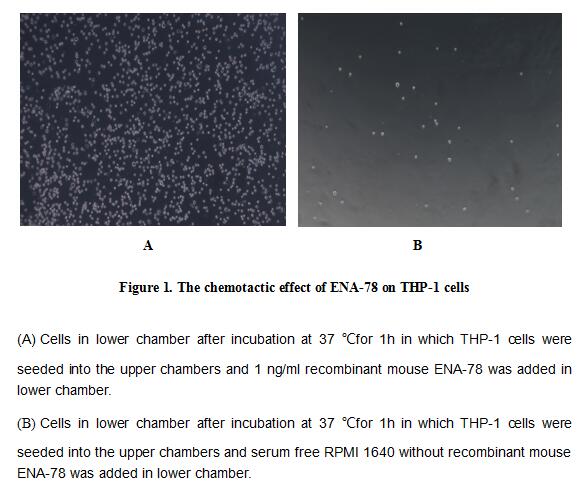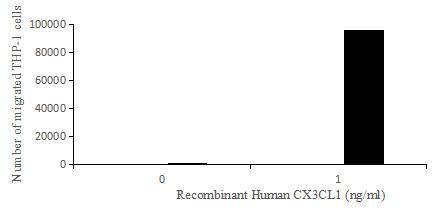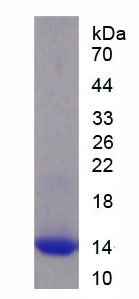Active Epithelial Neutrophil Activating Peptide 78 (ENA78)
CXCL5; SCYB5; Chemokine C-X-C-Motif Ligand 5; Small Inducible Cytokine Subfamily B(Cys-X-Cys),Member 5; Neutrophil-activating peptide ENA-78
- Product No.APA860Mu02
- Organism SpeciesMus musculus (Mouse) Same name, Different species.
- Buffer FormulationPBS, pH7.4, containing 0.01% SKL, 5% Trehalose.
- Traits Freeze-dried powder
- Purity> 97%
- Isoelectric Point9.5
- ApplicationsCell culture; Activity Assays.
- DownloadInstruction Manual
- UOM 10µg50µg 200µg 1mg 5mg
- FOB
US$ 227
US$ 568
US$ 1136
US$ 3408
US$ 8520
For more details, please contact local distributors!
ACTIVITY TEST

Epithelial Neutrophil Activating Peptide 78 (ENA-78) is a member of the CXC subfamily of chemokines. Full-length ENA-78 is 114 amino acids (aa) in length with a predicted molecular weight of 12 kDa. ENA-78 is expressed by many immune cells, such as macrophages, eosinophils, as well as non-immune cells including mesothelial cells, and fibroblasts. Soluble ENA-78 potently chemoattracts T cells and monocytes, while the cell-bound chemokine promotes strong adhesion of leukocytes to activated endothelial cells, where it is primarily expressed. Thus, chemotaxis assay used 24-well microchemotaxis system was undertaken to detect the chemotactic effect of ENA-78 on THP-1 the human monocytic cell line. Briefly, THP-1 cells were seeded into the upper chambers (150 ul cell suspension,106 cells/ml in RPMI 1640 with FBS free) and different concentrations of recombinant mouse ENA-78 diluted with serum free RPMI 1640 was added in lower chamber with a polycarbonate filter (8 um pore size) used to separate the two compartments. After incubation at 37 ℃ with 5% CO2 for 1h, the filter was removed, then cells in low chamber were observed by inverted microscope at low magnification (×10) and the number of migrated cells were counted using Fluorescence Activating Cell Sorter. Result shows ENA-78 is able to induce migration of THP-1 cells. The migrated THP-1 cells in low chamber at low magnification (×10) were shown in Figure 1. Statistical results of FACS were shown in Figure 2. The optimum chemotaxis of ENA-78 occurs at 1 ng/ml.

Figure 2. The chemotactic effect of ENA-78 on THP-1 cells
USAGE
Reconstitute in 10mM PBS (pH7.4) to a concentration of 0.1-1.0 mg/mL. Do not vortex.
STORAGE
Avoid repeated freeze/thaw cycles. Store at 2-8°C for one month. Aliquot and store at -80°C for 12 months.
STABILITY
The thermal stability is described by the loss rate. The loss rate was determined by accelerated thermal degradation test, that is, incubate the protein at 37°C for 48h, and no obvious degradation and precipitation were observed. The loss rate is less than 5% within the expiration date under appropriate storage condition.
GIVEAWAYS
INCREMENT SERVICES
-
 BCA Protein Quantification Kit
BCA Protein Quantification Kit
-
 Molecular Mass Marker for Protein
Molecular Mass Marker for Protein
-
 Monoclonal Antibody Customized Service
Monoclonal Antibody Customized Service
-
 Polyclonal Antibody Customized Service
Polyclonal Antibody Customized Service
-
 Protein Activity Test Experiment Service
Protein Activity Test Experiment Service
-
 Electrophoretic Mobility Shift Assay (EMSA) Experiment Service
Electrophoretic Mobility Shift Assay (EMSA) Experiment Service
-
 Buffer
Buffer
-
 Lentivirus Packaging Experiment Service
Lentivirus Packaging Experiment Service
-
 Adenovirus Packaging Experiment Service
Adenovirus Packaging Experiment Service
-
 Real Time PCR Experimental Service
Real Time PCR Experimental Service
-
 Spike RBD Protein (S-RBD)
Spike RBD Protein (S-RBD)
-
 Protein G
Protein G
-
 Protein A
Protein A
| Magazine | Citations |
| Journal of Biochemical and Molecular Toxicology | Ameliorative Effects of Curcumin on Fibrinogen-Like Protein-2 Gene Expression, Some Oxido-Inflammatory and Apoptotic Markers in a Rat Model of l-Arginine-Induced Acute Pancreatitis. Pubmed:26862043 |
| Journal of Biochemical and Molecular Toxicology | Ameliorative Effects of Curcumin on Fibrinogen-Like Protein-2 Gene Expression, Some Oxido-Inflammatory and Apoptotic Markers in a Rat Model of l-Arginine-Induced Acute Pancreatitis pubmed:26862043 |
| OncoTargets and Therapy | The clinical significance of CXCL5 in non-small cell lung cancer. pubmed:29200871 |
| Biochimie | Activated CXCL5-CXCR2 axis promotes the migration, invasion and EMT of papillary thyroid carcinoma cells via modulation of β-catenin pathway Pubmed:29471001 |
| Cancer Biology & Therapy | Activation of CXCL5-CXCR2 axis promotes proliferation and accelerates G1 to S phase transition of papillary thyroid carcinoma cells and activates JNK and p38 … Pubmed: 30404567 |
| Respiratory Research | Phospholipase Cε plays a crucial role in neutrophilic inflammation accompanying acute lung injury through augmentation of CXC chemokine production from … Pubmed: 30634975 |
| American Journal of Pathology | Interleukin17–CXCR2 axis facilitates breast cancer progression by up-regulating neutrophil recruitment Pubmed: 31654638 |
| Bioactive Materials | Secretions from hypochlorous acid-treated tumor cells delivered in a melittin hydrogel potentiate cancer immunotherapy 34820587 |
| Am J Cancer Res | Differential expression profile of CXC-receptor-2 ligands as potential biomarkers in pancreatic ductal adenocarcinoma Pubmed:35141005 |







